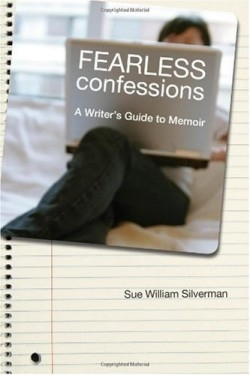Fearless Confessions
- 2009 INDIES Winner
- Honorable Mention, Writing (Adult Nonfiction)
“I sometimes think only autobiography is literature,” Virginia Woolf wrote. While some may question whether memoirs qualify as great art, they are certainly popular these days. In her new book, memoirist Sue William Silverman, author of Love Sick: One Woman’s Journey Through Sexual Addiction and Because I Remember Terror, Father, I Remember You, taps into this trend, providing practical advice for writers ready to put the most intimate details of their lives into print.
Here aspirants will find tips on everything from finding their voice and formulating plot to marketing the finished product. Writing exercises at the end of each chapter provide opportunities to put pen to paper, or fingers to computer keys, as it were. There’s also a reading list, plentiful examples of successful forays into the form, and copious resources for fledgling and well-versed writers alike.
Silverman, a faculty advisor at the Vermont College of Fine Arts, writes about making the best use of metaphor (using the moon, alas!) and writing “dark and stormy moments” that draw readers in. She counsels on using the “Voice of Innocence” versus the “Voice of Experience,” or a skillful blending of both, and the ways in which concise language can captivate and engage. Here the advice seems a bit on the simplistic side: “Avoid the 3 As in writing: adjectives, adverbs, and abstractions. Rely on nouns and active verbs.” Then again, perhaps all writers need to be reminded of these basic rules from time to time.
“The first life isn’t fully lived, fully seen or understood, until we write it,” Silverman writes. “Until I write the past it flickers in my minds eye, ghostly, like an old newsreel. In black-and-white photos of my Russian ancestors-photos that survived a boat trip from the Old Country to the New World-faces fade as if they’ve aged while sitting in cardboard boxes.” For Silverman, the act of picking up a pencil returns these once-powerful presences to life.
Silverman effectively addresses questions that loom large in the aspiring memoirists mind. Should I really write this? What will it do to my family and friends? Silverman, who has written about her childhood sexual abuse as well as sexual addiction, insists that facing even the most painful realities is the only way to find peace. “Writing is a way to remove the muzzle and blinders from childhood,” she says. “Writing is a way to take possession of-fully own-my life.”
Reviewed by
Allison Block
Disclosure: This article is not an endorsement, but a review. The publisher of this book provided free copies of the book to have their book reviewed by a professional reviewer. No fee was paid by the publisher for this review. Foreword Reviews only recommends books that we love. Foreword Magazine, Inc. is disclosing this in accordance with the Federal Trade Commission’s 16 CFR, Part 255.

